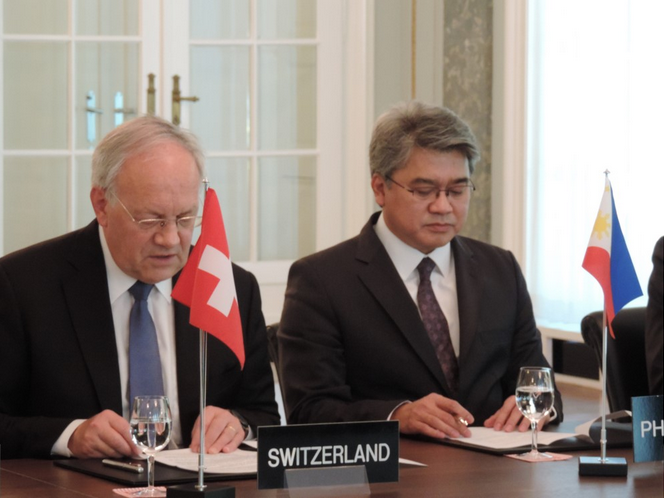Duterte ratifies PH-EFTA FTA

Manila Bulletin | 7 January 2018
Duterte ratifies PH-EFTA FTA
By Bernie Cahiles-Magkilat
The President signed and confirmed the FTA deal with EFTA, which comprises four of the wealthiest states such as Iceland, Liechtenstein, Norway and Switzerland, on December 8, 2017.
Once concurred by the Senate, the EFTA will be the Philippines’ second comprehensive bilateral FTA after Japan.
The PH-EFTA FTA covers trade in goods, services, investment, government procurement, intellectual property rights, competition and sustainable development.
It incorporates the existing World Trade Organization rules and obligations with respect to areas governing trade in goods and trade in services with additional disciplines agreed upon by both parties.
Upon entry into force, the PH-EFTA FTA will provide the Philippines duty-free market access to all industrial and fisheries products to the EFTA member states, with the Philippines benefiting from liberal rules of origin requirements to qualify for preferential treatment.
The EFTA member states made offers in all categories of services sectors in all modes of supply which present opportunities available to Philippine service suppliers for both skilled workers and professionals.
The Department of Trade and Industry led the negotiations on behalf of the Philippines together with other government agencies. Then DTI Secretary Adrian S. Cristobal Jr. signed the agreement in Bern, Switzerland on April 28, 2016.
DTI Undersecretary Ceferino S. Rodolfo said the Senate ratification of the FTA will depend on the Senate calendar.
Once ratified by the Senate, the DTI expects that the impact of this trade deal with four of the world’s most developed economies can be felt immediately although experience would show that results of most FTAs become tangible only in a year or two.
The Philippines is looking at benefiting from EFTA’s vast industries in the areas of shipbuilding, iron and steel, automotive and automotive parts and components, and aerospace and information technology-business process management (IT-BPM), and chemicals.
In terms of shipbuilding, Norway has the most advanced industry and the Philippines hopes to tap this op-portunity to build the capability of its booming shipbuilding and ship repair sector.
The Philippines also sees potential exports in creative services which include editing, sound mixing, dubbing, animation, and computer graphics.
In 2014, the top Philippine exports to the EFTA member states include gold in semi-manufactured forms, digital monolithic integrated circuits, aircraft parts, printed circuits, artificial teeth and silver. Philippine imports from EFTA include medical equipment, diagnostic or laboratory reagents, parts of airplanes or helicopters and wrist-watches.
The PH-EFTA Joint Declaration on Cooperation was signed on June 23, 2014 in Reykjavik, Iceland. Consultations started in 2013 prior to the negotiations.
EFTA member states are also among the economies with the highest Gross Domestic Product (GDP) per capita. Liechtenstein has the second highest GDP per capital in the world valued at $89,400, while Switzerland, the largest market among the EFTA member states, has a GDP per capita of $54,800, and ranks 11th in the economies with the highest GDP per capita.
Improving market access with Europe through EFTA will encourage investments in the services and non-services sector, bring in high value added products, technological knowhow, and capital from their highly developed economies to our local economy.
Establishing a strong foothold in the European market is a key component of the country’s trade strategy.
Forging a trade pact will open access for the Philippines into EFTA’s vast global network of preferential trade agreements outside the European Union. EFTA currently comprises 25 agreements with 35 countries and territories.
In ASEAN, other countries have bet¬ter market share in the EFTA market than the Philippines.
Vietnam was EFTA’s largest import source in ASEAN with 30.26 percent market share based from EFTA’s total ASEAN imports from 2008-2012.
Vietnam, Thailand, Malaysia, and Indonesia are also negotiating FTA deals with the rich EU bloc. Singapore has an existing FTA with EFTA.





